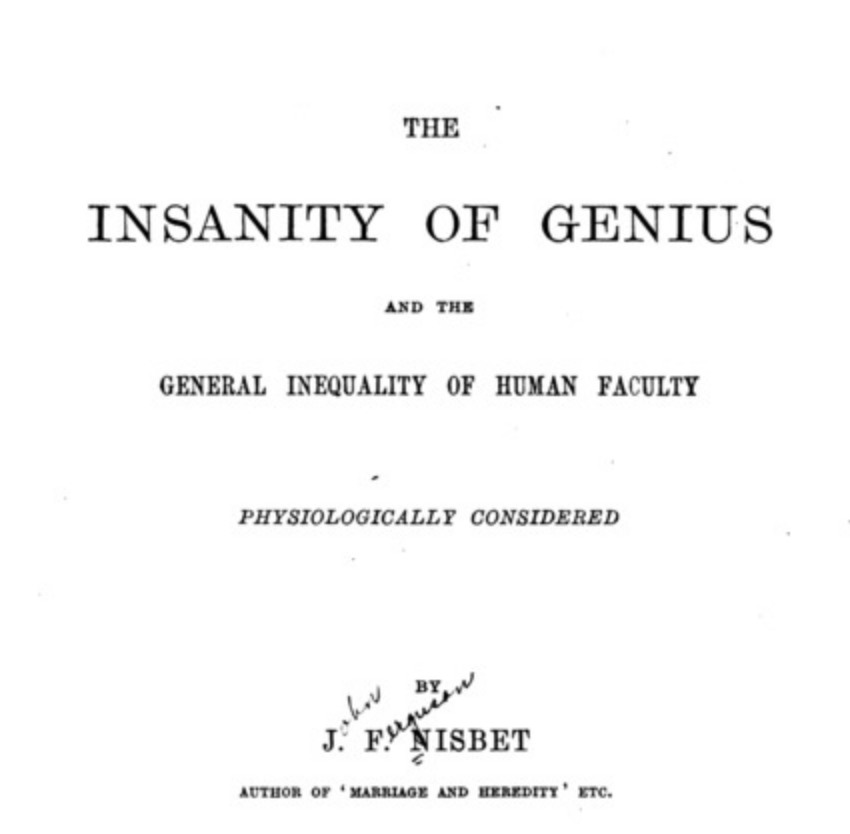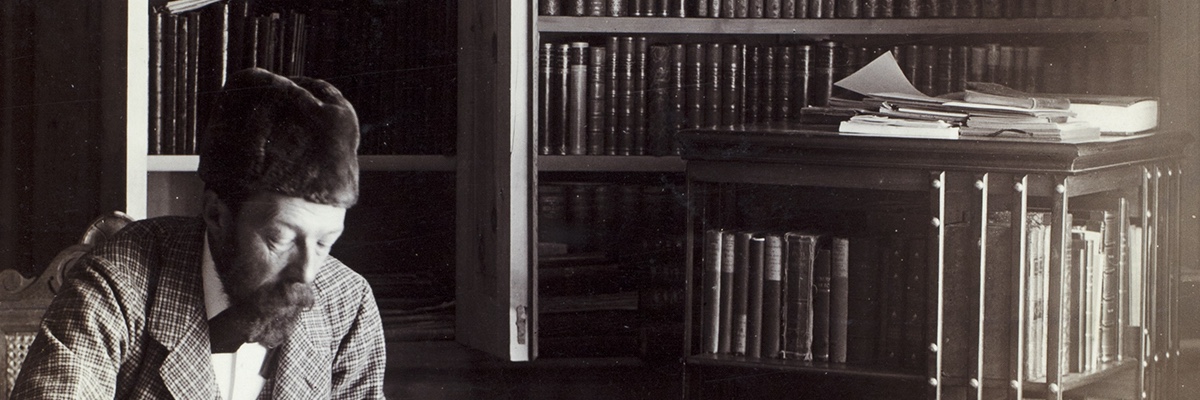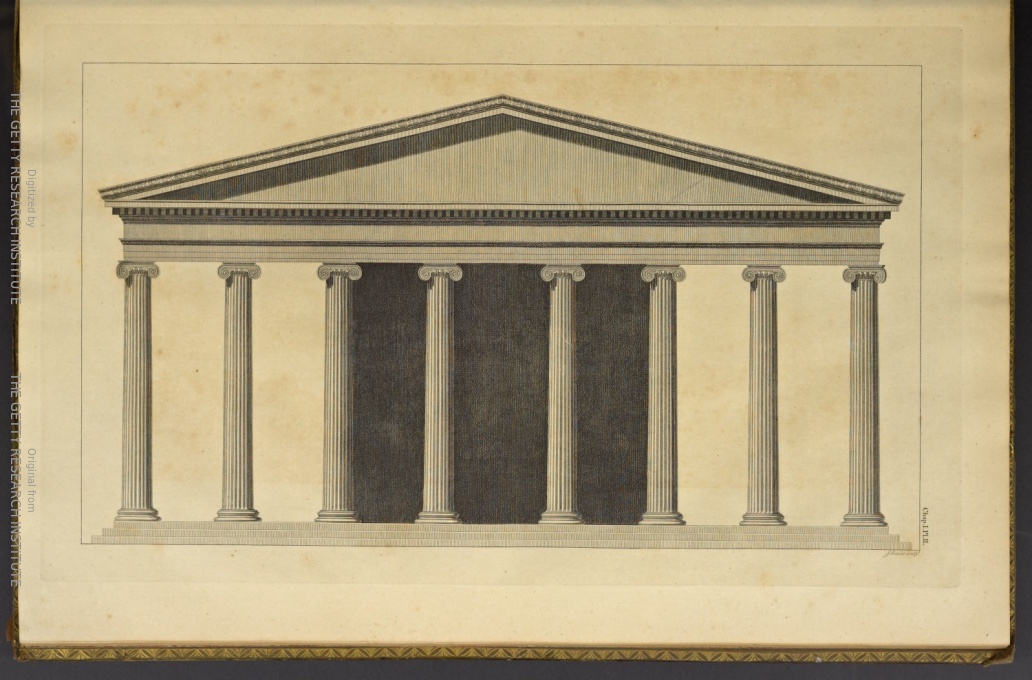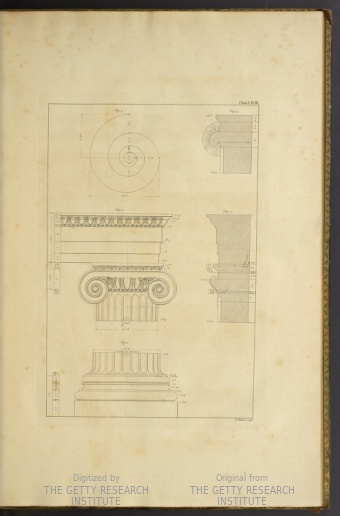In John Addington Symonds’ Memoirs, a passing comment and marginal note regarding J. F. Nisbet’s The Insanity of Genius and the General Inequality of Human Faculty subtly reveals Symonds’ contention with the theories of his contemporaries regarding a cause for differences in sexuality.

In the second chapter of his Memoirs, titled “Containing Material Which None but Students of Psychology and Ethics Need Peruse,” Symonds meditates on his first stirrings of sexual instinct. Here is where he realizes his “inborn craving after persons of [his] own sex” (p. 101, Memoirs). He goes on to cite Paul Moreau, Benjamin Tarnowski, and Richard von Krafft-Ebing, interpreting their sexologist arguments as tying sexual inversion to a neurotic disorder. After considering this theory, Symonds admits that he exhibits many of the symptoms that Krafft-Ebing recognizes as hereditary neuroticism that predisposes its subject to sexual inversion.
However, Symonds denies that he is the victim of an “exceptional neurotic malady” (p.102, Memoirs) and opposes Krafft-Ebings theory by arguing that his high degree of nervous energy has in fact been useful in his success in writing and scholarship.
“It is notorious that in literature I have done a very large amount of work, not only brilliant, but solid and laborious, which has placed me in the front rank of English authors.” (p. 102, Memoirs)
In reading Symonds’ works, A Problem in Greek Ethics, for example, it is easy to see the meticulous treatment with which he combs through Greek literature, so perhaps his self-recognition of his “brilliant” work is valid. The point of tension Symonds sees is the notion of a pathological or biological reason for sexual inversion. Specifically, he finds Nisbet’s The Insanity of Genius paradoxical.
Here we approach too near to the paradox that genius is a species of madness. (p. 103, Memoirs)
Symonds’ marginal note refers to Lombroso’s Man of Genius and Nisbet’s Insanity of Genius as works that are “upholding the hypothesis I attempted to combat” (p. 104, Memoirs). This hypothesis expands past just a tie with intelligence, as Symonds applies these principles to his ideas of the reason for sexual inversion.
It is likely that the circumstances under which Symonds read Scottish journalist and author John Ferguson Nisbet’s 1891 The Insanity of Genius was to critique the general notion that someone who exhibits traits of genius are mad. Broadly, Symonds finds fault in the general concept advanced by pathological psychologists that abnormality (sexual inversion in his case) is a sickness or hereditary disease. He sees sexual inversion as a complex variety of type exhibited by nature.
Nisbet’s work contains theories that Symonds would have disagreed with based on his personal beliefs about his own sexuality (quoted below) and his beliefs that male-male relationships were of benefit to society and had spiritual value (Ch. I, A Problem in Greek Ethics).
I have no feminine feelings for the males who rouse my desires. The anomaly of my position is that I admire the physical beauty of men more than women, derive more pleasure from their contact and society, and am stirred to sexual sensations exclusively by persons of the male sex. (p. 103, Memoirs).
The problem Symonds likely saw in The Insanity of Genius was Nisbet’s assumption that sexual selection is directly tied to Charles Darwin’s survival of the fittest argument. Symonds probably saw the hole in Nisbet’s argument that if natural selection (the principle that the fittest will survive and reproduce to preserve the variations most beneficial to the community) is directly correlated with intelligence, then a “genius” like Symonds would not “fit” in and any sexual inversion would deny him the opportunity to reproduce (p. 327, The Insanity of Genius). This supports Symonds’ denial of a physical/pathological basis of sexual inversion as well as genius. Nisbet as well as Darwin would classify Symonds, even if a genius, as “unfit” or as an error of sexual instinct.
A particularly interesting moment in The Insanity of Genius is when Nisbet analyzes nineteenth century French novelist Gustave Flaubert’s correlation between the development of intellectual power and his increased epileptic attacks. Nisbet claims that without his malady, Flaubert would have been relegated to the life of a more menial occupation like a lawyer instead of a writer. The place where I believe Symonds could feel a relation while reading this is when Nisbet characterizes Flaubert as a laborious and obsessed writer having “no passion for the fair sex, to whom, indeed, throughout his life he appears to have cherished an absolute repugnance” (p.140, The Insanity of Genius). This strikes a certain resonance with the way Symonds characterizes his own genius. Additionally, Symonds’ references to Flaubert’s distaste of women suggests a familiarity with this sort of sexually inverted (or perhaps asexual) genius.
I believe that what would have bothered Symonds is that whether the genius person is vain and egotistical, licentious, or only shows genius in certain areas, Nisbet uses a general theory of faculty and character as a catch-all to define all those who he considers genius. However, I think that Symonds would have taken solace in Nisbet hedging his own theory by saying “If it could be shown that all men, great and small, distinguished and undistinguished, were equally subject to nerve-disorder, the theory of genius as a neurosis would fall to the ground” (p. 315, The Insanity of Genius).
Work Cited:
Symonds, John Addington, and Amber K Regis. The Memoirs of John Addington Symonds : a Critical Edition. London: Palgrave Macmillan, 2016.
Symonds, John Addington. 2012. “A Problem in Greek Ethics,” essay, in John Addington Symonds (1840-1893) and Homosexuality: a Critical Edition of Sources. Edited by Sean Brady. London: Palgrave Macmillan.
Nisbet, John Ferguson. The Insanity of Genius and the General Inequality of Human Faculty: Physiologically Considered. New ed. London: Ward & Downey, 1891.




